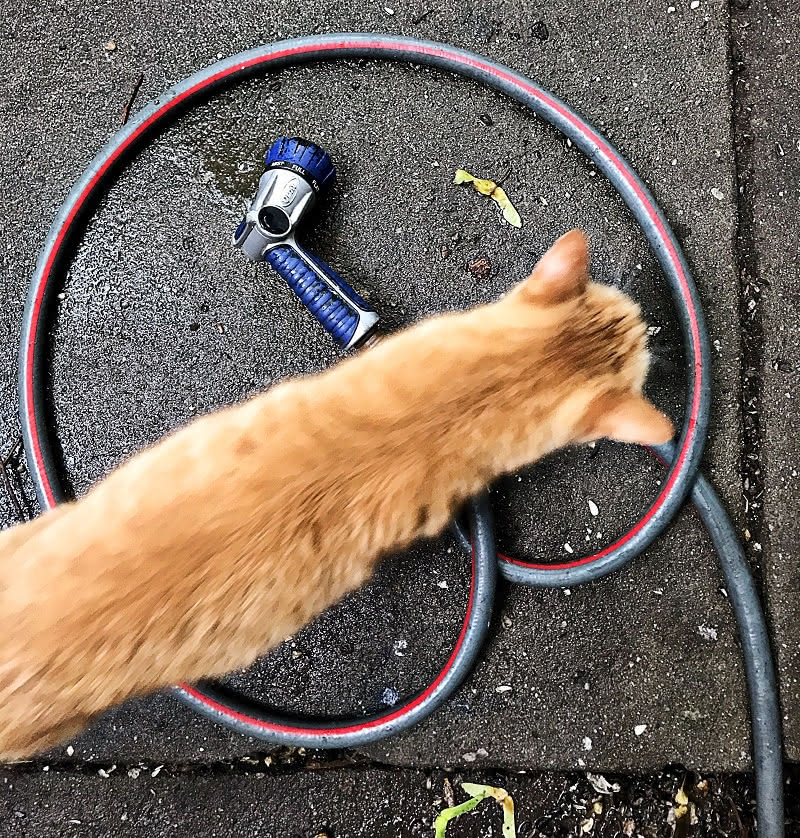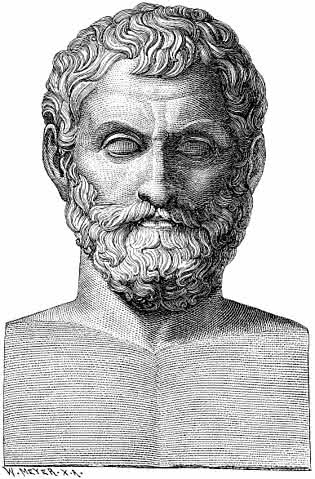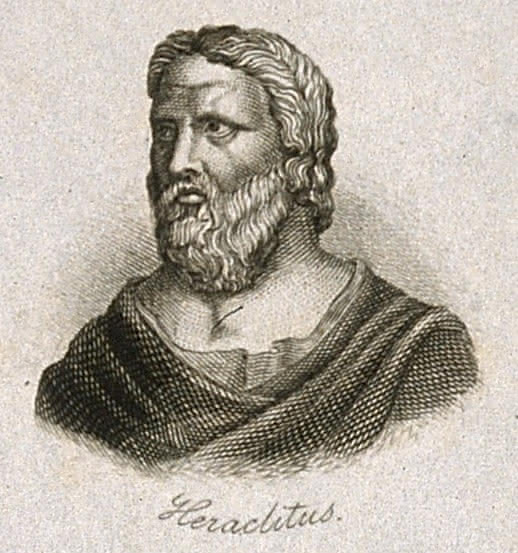From my perambulations around Brooklyn, I have observed that no one uses more water than men hosing off the sidewalk, street, or other variety of ground outside. It has been asked why the-man-with-the-hose uses so much water. There must be a point beyond which the ground can become no cleaner. Yet the man-with-the-hose does not abide by such simplistic thinking. Never has the-man-with-the-hose uttered the words “this clean and no cleaner.”

Motivation of the-Man-With-the-Hose
What motivates the-man-with-the-hose? Is he engaged in a Sisyphean struggle against invisible grime? Does he suffer from some form of obsessive compulsive disorder? Is he, as some have mischievously suggested, motivated by some notion that would make even Dr. Freud blush? While each of the foregoing suggestions is compelling in one way or another, I must knock each down as quickly as I suggested it.
One look upon the countenance of the-man-with-the-hose reveals no indicia of struggle or lewdness. Instead, the astute observer will find that the-man-with-the-hose is in a state of perfect, blissful serenity. To the extent the man with the hose struggles, it could only be to achieve a more perfect serenity. So long as the-man-with-the-hose is effecting streams into the street, his mind is as well-ordered as it can be.
Having never once wielded a hose, I cannot discuss the beliefs of the-man-with-the-hose from personal experience. Instead, I will endeavor to explain the man with the hose for your benefit by combining my observations of many-a-man-with-the-hose with the knowledge I gleaned in the course of obtaining an undergraduate philosophy degree.
The Spirit of Pre-Socratic Philosophy Lives in the the-Man-With-the-Hose
If one views the-man-with-the-hose as a philosopher in the spirt of a couple of the preeminent pre-Socratic philosophers, one can begin to make sense of his behavior. Perhaps when the-man-with-the-hose saturates the ground, he is grasping at the true nature of things. The-man-with-the-hose has one of two heroes: Thales of Miletus and Heraclitus of Ephesus.
The-Man-With-the-Hose Follows Thales of Miletus
Thales, who lived during the seventh and sixth centuries before Christ, is often regarded as the first Western philosopher. Through the writings of Aristotle, we understand that Thales argued that water is the single material principle of everything.

To be sure, I do not mean to say that the-man-with-the-hose is, like Thales, a monist who argues that water is the single material principle of everything. But, like Thales, the-man-with-the-hose ponders the nature of things as he watches the water from his hose splash upon the Earth before returning to it. Seen as a latter-day Thales, the-man-with-the-hose is perhaps our translucent hope in murky times, spraying his internal reflections all about, allowing them to be absorbed, evaporated, or frozen – depending on the weather that particular day – into the public consciousness.
Thales stood at the vanguard of an intellectual golden age in the west; might the innocuous man-with-the-hose stand at the vanguard of the Occidental revival?
The-Man-With-the-Hose Follows Heraclitus of Ephesus
While many-a-man-with-the-hose count Thales as their primary or sole inspiration (if any man-with-the-hose actually counts Thales as an inspiration at all, that is), others look elsewhere. Some man-with-the-hose are possessed by a later pre-Socratic philosopher, Heraclitus, and will nod off at the mere mention of any other thinker (he could also be zoning off with the hose on, however).

Heraclitus was born about a decade after Thales passed from water to water, and lived from the sixth century to the fifth century before Christ.
It was Heraclitus who famously stated that one cannot step into the same river twice. The like-minded man-with-the-hose lives by Heraclitus’ river maxim. For the man with the hose, each stream created by his diligent cleaning is unique, and each drop of water is new.
Heraclitus stated that it is death to the soul to become water, and death to the water to become earth, but that water comes from the earth and souls come from water. Perhaps the-man-with-the-hose is putting Heraclitus’ cycle to the test. The man with the hose views the water from the hose as his soul. He sprays his soul all over the street in order that it might be born anew. The-man-with-the-hose often finds that his soul conveniently rises from right around when his job, family, or life generally calls upon him to do something other than threatening the integrity of the impeccably clean street, sidewalk, or ground.
Final Thoughts on the-Man-With-the-Hose
It is certainly possible, if not probably (but perhaps not probable), that the-man-with-the-hose is engaged in something serene and reflective beyond washing the ground well-past the point of excess. But even if the man with the hose is not knowingly following in the footsteps of the great thinkers of the Western tradition, perhaps he is emulating them without knowing it. Who among us can confidently say that were Thales or Heraclitus among us today, they would not be among the ranks of the-man-with-the-hose?
With all that being said, I would be negligent to omit the possibility that the-man-with-the-hose just enjoys using gratuitous amounts of water.
No matter the truth of the-man-with-the-hose, I can confidently say that I have never seen a man appear more content than the-man-with-the-hose. Whatever the reason for his fulfillment, however, the rest of us must concern ourselves with more mundane matters than his personal tranquility. When crossing the moat of the-man-with-the-hose, be sure to first get his attention.